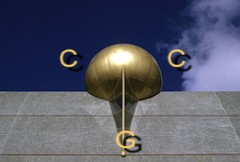CC™ Headline News
President Vladimir Putin warned Thursday of a “real” risk of nuclear war if the West escalates the conflict in Ukraine, offering a defiant and emboldened stance in his annual speech to Russians.
Speaking in Moscow, Putin said his soldiers were advancing in Ukraine and warned the West of “tragic consequences” for any country that dared to send troops to Kyiv.
They have announced the possibility of sending Western military contingents to Ukraine… The consequences for possible interventionists will be much more tragic,” he said in his address to the nation.
“They should eventually realise that we also have weapons that can hit targets on their territory. Everything that the West comes up with creates the real threat of a conflict with the use of nuclear weapons, and thus the destruction of civilisation,” said Putin.
His comments appeared to be a response to French President Emmanuel Macron’s refusal earlier this week to rule out sending troops to Ukraine — a stance that drew swift rejection from other leaders in Europe.
Nevertheless, the debate has struck a nerve in Moscow, which has long seen its conflict with Ukraine as part of a wider “hybrid war” being waged against it by NATO.
Western leaders have repeatedly criticised Putin for what they see as his reckless use of nuclear rhetoric.
After pulling Russia out of arms control treaties with the United States and previously warning he was “not bluffing” when he said he was ready to use nuclear weapons, Putin had appeared in recent months to dial down his nuclear threats.
But the fresh warning comes with the Kremlin buoyed by recent gains on the battlefield in Ukraine, but also an economy that has largely defied sanctions and ahead of an election certain to extend Putin’s term in the Kremlin until 2030.
- Russian forces ‘advancing’ -
The current state of affairs marks a sharp reversal in fortunes for Moscow over the last 12 months.
Last year at this time, Russian troops were reeling from Ukrainian counteroffensives that pushed them back in northeastern and southern Ukraine.
But after a Ukrainian campaign in the summer of 2023 failed to bring similar results, Kyiv is back on the defensive.
The initially strong Western support for Ukraine also appears to be fraying, with a $60-billion US aid package stalled in Congress.
Outgunning Ukrainian forces on the battlefield, Putin’s troops seized the eastern stronghold of Avdiivka and are attempting to build on their advances.
Putin on Thursday pointed to recent successes.
“The combat capacity of our armed forces has increased many times over,” he said.
“They are advancing confidently in a number of areas,” he added, without providing details.
Flanked by Russian tricolour flags and standing alone on stage at the Gostiny Dvor Palace near Moscow’s Red Square, the Russian leader reeled off his country’s arsenal of advanced weapons, including the Zircon and Kinzhal supersonic missiles.
But he slammed reports Russia was preparing to deploy a nuclear weapon in space as a “ploy” by Washington to draw Moscow into arms control talks “on their terms”.
- Election campaign -
Putin also touted Russia’s strong economic performance at home and outlined a number of small-scale domestic reforms as part of his pitch to Russians ahead of next month’s presidential election.
His speech was broadcast not only on state television but also on large digital screens and free of charge in cinemas across the country.
On the economic front, he said Russia was faring better than many expected.
Massive investment in military production, as well as high salaries and benefits for soldiers, has largely shielded the economy from the worst consequences of Western sanctions.
There is little doubt on the outcome of the March 15-17 vote, with all genuine opposition candidates barred from standing and the Kremlin’s most vocal critic Alexei Navalny now dead.
But Putin has still been campaigning, traveling around the country and making numerous media appearances since the start of the year, including recently flying a Russian bomber.
The 71-year-old former KGB officer, in power since the final day of 1999, is the longest serving Russian leader since Joseph Stalin — a record he is set to pass during his next six-year term.
Even before Putin ordered forces into Ukraine in February 2022, he had increasingly portrayed himself as a defender of Russian values against a decadent, liberal and expansionist West.
He has used the military campaign to escalate a crackdown on domestic opponents, with hundreds prosecuted for criticising the Kremlin and its military offensive.
The speech came on the eve of a planned funeral for Putin’s top opponent Navalny, who died in prison on 16 February in unclear circumstances.
Putin, who famously never referred to the opposition leader by name, has remained silent on Navalny’s shock death that prompted outrage at home and abroad.
AFP















